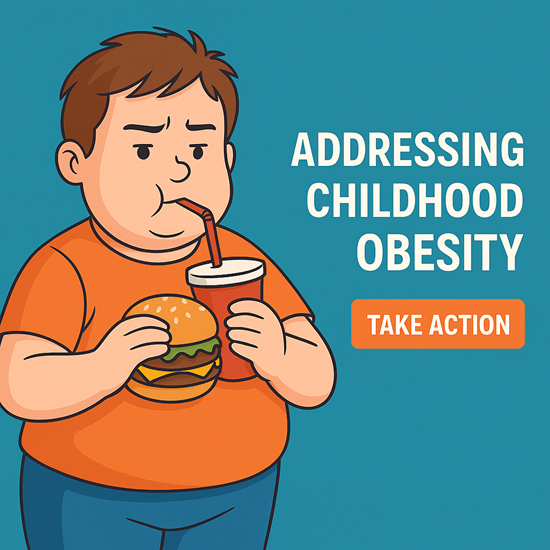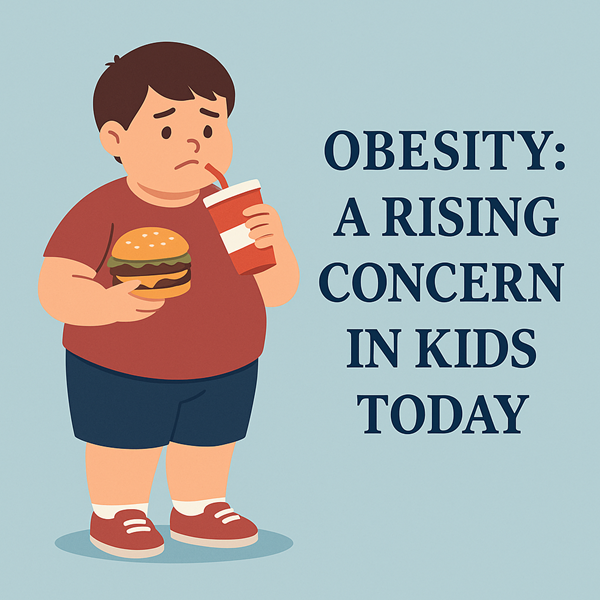Kids obesity is no longer just a matter of appearance, it has become a growing public health concern across the globe. With changing lifestyles, busy routines, and increasing dependence on digital devices and fast food, children today are facing an uphill battle when it comes to staying fit and healthy.
This blog post sheds light on the real causes, risks, and solutions surrounding Kids obesity — a must-read for parents, caregivers, and educators who want to ensure a healthier future for the next generation.
The Lifestyle Trap: Busy Parents, Sedentary Kids
In today’s fast paced world, most parents are juggling demanding work schedules and household responsibilities. As a result, convenience often takes priority over conscious choices, especially when it comes to food and daily habits.
Fast food has become a quick solution to mealtime struggles, and screens often replace traditional playtime. These lifestyle shifts, while understandable, have created a perfect storm for Kids obesity to thrive.
Many children today:
- Prefer screens over sports or outdoor play (read : How to reduce screen time for kids)
- Consume calorie dense, low nutrition fast food regularly
- Have irregular sleep cycles
- Lack sufficient physical activity ( read : Fun Educational Games to Play at Home)
These patterns, if unchecked, can lead to serious health challenges, both in Kids and later life.
Recognizing the Early Warning Signs
Kids obesity often begins subtly. A few extra pounds may not seem like a big concern initially, but over time, parents and doctors alike are noticing key warning signs:
- Fatigue or lack of energy
- Preference for sedentary activities
- Disinterest in sports or physical games
- Rapid or consistent weight gain
- Low self-esteem or social withdrawal
Ignoring these signs can lead to more serious complications that are harder to reverse with time.
Understanding the Key Causes of Kids Obesity
Obesity in children is rarely caused by one single factor. It is typically the result of a combination of poor eating habits, reduced activity levels, and lifestyle patterns. Some of the main contributors include:
1. Over-Reliance on Fast Food
Fast food is convenient and widely available. However, it is often high in calories, unhealthy fats, sugar, and sodium — all of which contribute to weight gain and poor nutrition.
2. Excessive Screen Time
Children today spend more hours than ever on smartphones, tablets, televisions, and computers. This sedentary screen time not only limits physical movement but also exposes children to aggressive junk food advertising.
3. Lack of Physical Activity
With academic pressure, safety concerns in urban areas, and limited access to open spaces, outdoor play has become increasingly rare. Physical activity is crucial for burning calories, building stamina, and boosting mental well-being.
4. Parents’ Limited Time and Energy
Working parents often find it difficult to monitor their child’s daily diet and routine. Processed snacks, sugary cereals, and ready-to-eat meals become the go-to option due to time constraints and fatigue.

Health Risks Associated with Kids Obesity
Obesity in children can have serious health consequences — some immediate, others long-term. The effects go far beyond physical appearance and can deeply impact a child’s overall well-being.
Short-Term Health Risks:
- Breathing difficulties, especially during physical exertion
- Joint and muscle pain
- Fatigue and low energy levels
- Skin conditions and digestive issues
- Emotional issues, including low self-esteem and social isolation
Long-Term Consequences:
- Type 2 Diabetes
- High blood pressure and cholesterol
- Increased risk of heart disease
- Hormonal imbalances
- Risk of adult obesity and related chronic conditions
- Higher chances of depression and anxiety
Early intervention is crucial to prevent these issues from becoming lifelong struggles.
Creating a Healthier Home Environment
Managing Kids obesity is not about enforcing strict diets or heavy exercise routines. It’s about making gradual, sustainable lifestyle changes for the entire family.
Here are some effective strategies that can help:
An Ideal Diet Plan for Children
Nutrition is the cornerstone of health. Parents can build a child’s diet around balance, freshness, and moderation.
Breakfast
- Whole grains like oats or poha
- Fresh fruits or smoothies (without added sugar)
- Eggs or peanut butter toast
- A glass of milk or plant-based alternatives
Lunch
- Roti or brown rice with sabzi and dal
- Curd or buttermilk
- Fresh salad (carrots, cucumbers, tomatoes)
- Seasonal fruits as dessert
Evening Snacks
- Roasted makhana, murmura, or chana
- Fruit chaat or corn salad
- Coconut water or lemon juice (no sugar)
Dinner
- Light soups, dal-rice or khichdi with vegetables
- Avoid deep-fried foods and sugary beverages
- Finish meals at least 1.5 hours before bedtime
A weekly “treat day” can be introduced to allow for favorite foods in moderation without guilt or restriction.
How Parents Can Address the Issue
Changing habits can be challenging, but with the right approach, it is achievable.
1. Start With Empathy, Not Criticism
Avoid labeling or shaming the child. Focus on positive communication about health, energy, and feeling good, not just losing weight.
2. Make It a Family Effort
When everyone in the house adopts healthier eating and activity habits, children feel encouraged and supported.
3. Set Boundaries for Screen Time
Introduce “no-screen zones” and fixed time limits. Replace screen time with interactive family activities like walking, playing, or storytelling.
4. Incorporate Fun Physical Activities
Physical activity should never feel like punishment. Dance, swimming, cycling, skating, let children pick what they enjoy most.
5. Reward Good Habits, Not Weight Loss
Celebrate effort and healthy choices, whether it’s choosing fruit over chips or walking to the park instead of watching TV.
What Schools and Communities Can Do
Preventing Kids obesity also requires collective responsibility from schools and the wider community.
Schools can:
- Encourage daily physical activity
- Ban unhealthy foods in the cafeteria
- Include health education in the curriculum
- Organize fitness and wellness events
Local communities can improve access to clean parks, provide safe zones for outdoor play, and promote awareness through events and workshops.
De-Stigmatizing Kids Obesity
It’s important to understand that Kids obesity is not always a result of neglect or poor parenting. In most cases, it stems from lack of awareness and the environment children grow up in.
Instead of judging, the focus must shift to understanding, support, and timely action. Children should never feel ashamed of their body. They need encouragement, love, and consistent guidance to make healthier choices.
Conclusion: Building a Healthier Future, One Step at a Time
Kids obesity is a real and growing concern — but it is not irreversible. With small, intentional changes in diet, activity, and mindset, families can build healthier routines that benefit both children and adults.
It’s not about perfection. It’s about progress. Every healthy meal, every family walk, every screen-free hour counts.
Raising healthy kids starts at home — with informed, mindful, and compassionate parenting. The journey may be slow, but the impact lasts a lifetime.
FAQs – Kids Obesity
Q1. Can Kids obesity be treated without medication?
Yes, most cases of Kids obesity can be addressed through diet, physical activity, and behavior modifications — without any medication.
Q2. What is the ideal physical activity level for children?
Children should engage in at least 60 minutes of moderate to vigorous activity every day.
Q3. How can I reduce my child’s screen time effectively?
Introduce screen-free family hours, encourage outdoor play, and use timers or parental controls to set healthy boundaries.
Q4. Is it okay for children to have occasional junk food?
Yes, in moderation. A weekly treat or special occasion indulgence is acceptable as long as it doesn’t become a regular habit.
Q5. Should I consult a pediatric nutritionist?
If the child’s weight is significantly above healthy levels or if dietary changes are confusing, professional guidance from a pediatric nutritionist can be very helpful.

Hi, I’m Prashant Jain — a curious soul, storyteller, and content creator at heart.I’ve always been drawn to the world of entertainment, travel, sports, health & lifestyle — not just as a writer, but as someone who genuinely lives these experiences. Whether I’m binge-watching the latest OTT series, exploring offbeat spiritual destinations in India, or diving deep into wellness routines and cricket match insights, I love sharing what I discover with like-minded readers.
PopNewsBlend is my way of blending personal journeys with meaningful stories — ones that inform, inspire, and keep you ahead of the curve. Everything I write comes from real observations, hands-on experiences, and a deep passion for understanding the world around us.
Discover more from Popnewsblend
Subscribe to get the latest posts sent to your email.








Pingback: How Parents Anger Shapes Kids Behaviour - Know Before It's Late
Pingback: Are You Protein Deficient? Signs, Causes & Indian Food Fixes
Pingback: How Much Sugar Is Too Much for Children? Expert Facts for Parents